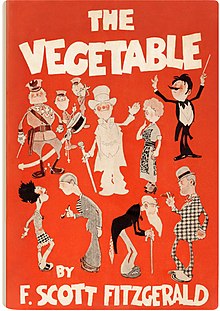The Vegetable, or From President to Postman

The Vegetable, or From President to Postman is a 1923 short story by F. Scott Fitzgerald that he developed into a play.[1]
Background[]
In the original publication of The Vegetable, or From President to Postman (1923), F. Scott Fitzgerald included the following quotation on the title page: “Any man who doesn’t want to get on in the world, to make a million dollars, and maybe even park his toothbrush in the White House, hasn’t got as much to him as a good dog has—he’s nothing more or less than a vegetable.” Fitzgerald used this quotation, which he claimed came “from a current magazine,” as a springboard for his only published play. This comic romp satirizes the ambitions of an ordinary man who wants to be President of the United States—that is, if he cannot make it as a postman.[2]
Plot[]
The play concerns the misadventures of the middle-class striver Jerry Frost. He is a 35-year-old "clerk for the railroad at $3,000 a year. He possesses no eyebrows, but nevertheless he constantly tries to knit them."[3] His marriage to Charlotte (30) is dull, and he is stereotypically hen-pecked by her (cf. Ralph Cramden, Fred Flintstone, Homer Simpson, et al.). We learn in the first act that Jerry wanted to be a postman, but that he somehow blames his wife for missing out on this ambition...
History[]
Following The Beautiful and Damned, Fitzgerald hoped to secure financial wealth for him and his wife. The play's text was published in book form by Scribners on April 27, 1923, in a print run of 7,650 copies, each sold for $1.50.[4]
In his youth, Fitzgerald had written and acted in plays (cf. The Captured Shadow [5]), and his work was generally recognized for qualities that should have translated to the stage: "he wrote commercially successful stories; he knew how to frame a scene; and his dialogue, at least in his best fiction, was smart, sophisticated, evocative."[6]
However, according to some critics, the play lacked focus.[7] Its premiere, in a single preview (Nov. 19, 1923) at Nixon's Apollo Theatre in Atlantic City, New Jersey,[8] was widely regarded as a disaster. Zelda Fitzgerald later wrote in a letter that the audience were “so obviously bored” and some walked out during the second act.[8] Fitzgerald himself wrote that "I wanted to stop the show and say it was all a mistake but the actors struggled heroically on." During the second intermission, Fitzgerald and Ring Lardner asked the lead actor, Ernest Truex, "Are you going to stay and do the last act?" The actor replied that he was, at which the pair of writers retorted that they were heading to a bar down the street.[9]
While Fitzgerald claimed to be proud of the work, and had hoped it would succeed, the critical and public reaction to the first and only performance left the author in a deep depression, followed by a drinking binge.[10]
It was, however, revived years later and produced by Lenox Hill Players, Inc., at the Cherry Lane Theatre, New York, April 10, 1929. It ran for only thirteen performances.
As a work first published in 1923, The Vegetable entered the public domain in the United States on January 1, 2019 and is now freely available online.[11]
References[]
- ^ F. S. Fitzgerald (1976). The Vegetable: or, From President to Postman. Scribner's.
- ^ Beilke, Debra, "Satirizing the American Nightmare: F. Scott Fitzgerald's The Vegetable". www.lexhamarts.org (retrieved 8/24/2016).
- ^ Fitzgerald, F. Scott, The Vegetable: Or, from President to Postman. Clifton, N.J.: A.M. Kelley, 1972. p. 6.
- ^ Bruccoli, Matthew J, and Jackson R. Bryer (1971). F. Scott Fitzgerald in His Own Time: A Miscellany. Kent, Ohio: Kent State University Press, p. 209.
- ^ F. Scott Fitzgerald (1928). The Captured Shadow. www.gutenberg.net.au.
- ^ Krystal, Arthur (Nov. 16, 2009). "Slow Fade: F. Scott Fitzgerald in Hollywood." The New Yorker (New York, N.Y.) 85.37.
- ^ Bruccoli, Matthew J, and Jackson R. Bryer (1971). F. Scott Fitzgerald in His Own Time: A Miscellany. Kent, Ohio: Kent State University Press.
- ^ a b Bruccoli, Matthew J. (1993). Some Sort of Epic Grandeur: The Life of F. Scott Fitzgerald. New York: Carroll & Graf, pp. 209
- ^ Turnbull, Andrew (1962). Scott Fitzgerald. New York: Scribner, p. 140
- ^ Bryer, Jackson R (1967). The Critical Reputation of F. Scott Fitzgerald: A Bibliographical Study.. Hamden, Conn.: Archon Books.
- ^ Fitzgerald, F. Scott (Francis Scott) (Dec 19, 2019). "The Vegetable; or, From President to Postman". Retrieved Jan 5, 2020 – via Project Gutenberg.
External links[]
 The full text of The Vegetable: Or, from President to Postman at Wikisource
The full text of The Vegetable: Or, from President to Postman at Wikisource- The Vegetable, or From President to Postman at Project Gutenberg
- 1923 plays
- American plays
- Plays based on short fiction
- Works by F. Scott Fitzgerald
